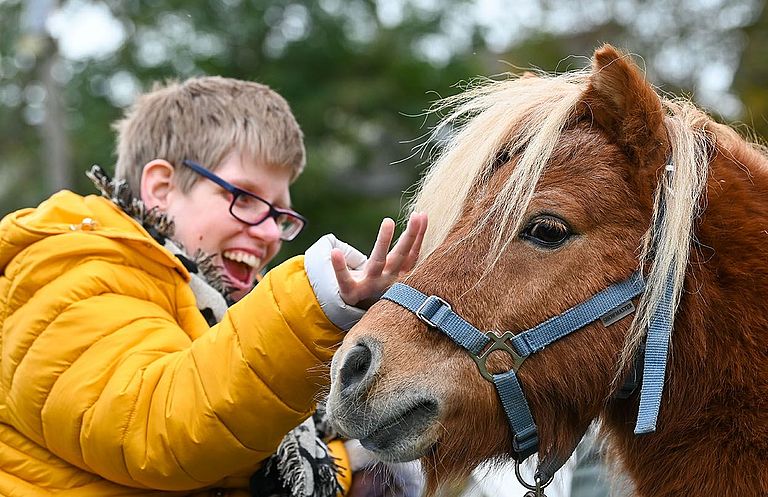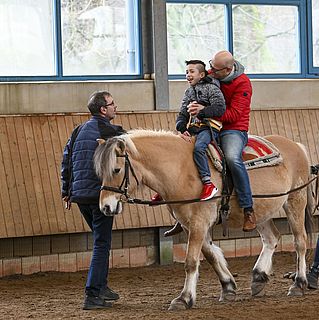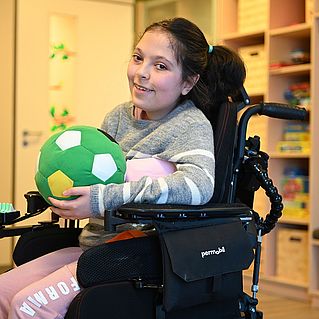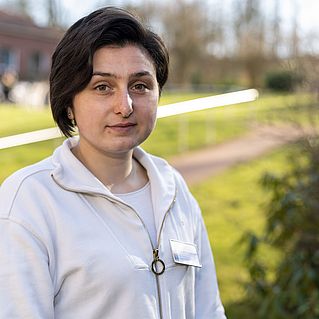
Close to people | Stories from Bethel
Almost like a holiday: A visit to the farm of mercy
"Yes!" shouts Werner Meier, holding a bowl full of apple slices in front of a goat's mouth. The animal doesn't take long to respond: its tongue darts out and manoeuvres two chopped pieces between its teeth. The goat chews and Werner Meier says: "Nice!" Otherwise, he hardly speaks during the feeding. That is unusual. The 77-year-old, who lives in Bethel House Von-der-Tann-Straße in Dortmund due to a mental disability with the onset of dementia, sometimes talks and shouts almost non-stop. But at the Wattenscheid sanctuary, Werner Meier now simply sits on a wooden bench, places his right hand on the goat's neck and smiles.
Feeling contentment, inner peace and harmony: that's what the regular visits of impaired people to the Gnadenhof are all about. And it works. For Werner Meier as well as for Gerda Blumenröther, Martina Richter and Nele Bach, who, like him, live in the Bethel facility and have also come to the site in the Bochum district between a housing estate and the 40 motorway. How does it work? Jennifer Krämer, who works at Haus Von-der-Tann-Straße as a curative education nurse in the day-care programme and drove the clients here with her colleague Julia Niemeier, explains it like this: "Both sides, the people and the animals, can be who they are. You don't have to do anything here, you just have to allow it."
At the Gnadenhof, it is possible to have conversations with the clients that she cannot have with them at the centre, reports Jennifer Krämer. "Some residents experience that they often misunderstand things in everyday life or are told to do things differently. This makes them feel insecure in their perception," she explains. "On the farm, they get honest and direct feedback from the animals' behaviour. As long as I do everything right, the animals stay with me and relax. If I do something wrong, they avoid contact or leave immediately." This form of confirmation leads to relaxation, which can often be seen in their facial expressions: hardened facial features, even spasticity, loosen up and soften on the farm.
The excursions to Wattenscheid also allow the disabled people to experience new things away from the daily structure of the centre, to experience variety - and to enjoy it. "For them, their time at the Gnadenhof is almost a bit like a holiday. Only without suitcases," says Jennifer Krämer.
The visiting time is over quickly and the clients reluctantly make their way back to the cars. A little later, it's time to leave, travelling through the evening traffic back to Dortmund. This time it's quite a quick journey; in the past it has taken two hours. "But the effect that the stays in Wattenscheid have on our people," says Jennifer Krämer, "makes up for the effort we put in."
Text: Philipp Kreutzer | Photos: Christian Weische
This story simply told
Many animals live at the Wattenscheid sanctuary. Their former owners no longer wanted them. Once a week, people with disabilities from Dortmund visit the farm. They stroke cats, feed goats and groom horses. They really enjoy it. For them, it's almost like being on holiday at the Gnadenhof.
Would you like to find out more?
Contact
Haus Von-der-Tann-Straße
Von-der-Tann-Straße 40
44143 Dortmund
Head of department
Miriam Marschewski
Offers & services
Haus Von-der-Tann-Straße is centrally located in Dortmund's eastern city centre. It is integrated into a well-established neighbourhood with amenities such as a hairdresser, bakery, grocery shops, savings bank, weekly market and doctors.
The residential programme is aimed at adults with intellectual disabilities, complex multiple disabilities and epilepsy. It offers a suitable framework for personalised living arrangements and the development of individual life perspectives.













